Impact of Leadership Style on Employee Motivation - Business Report
VerifiedAdded on 2020/11/23
|37
|11685
|232
Report
AI Summary
This report delves into the effects of various leadership styles on employee motivation within Aaron Enterprise, a trench-less utility installation company. It begins with an introduction highlighting the importance of leadership in directing, planning, and motivating employees. The report then explores the theoretical background, reviewing key publications and themes related to different leadership styles such as transformational, transactional, and laissez-faire. It examines how leadership influences employee productivity, morale, and retention. The methodology section outlines the research approach, including the use of a research questionnaire and SPSS analysis to gather and interpret data. The report aims to determine the impact of leadership styles on employee motivation, providing valuable insights for business practices. The literature review covers the determination of leadership styles, the impact of leadership on the firm's ability to retain employees, the importance of employee communication, and the overall effect of leadership on the enterprise's success.
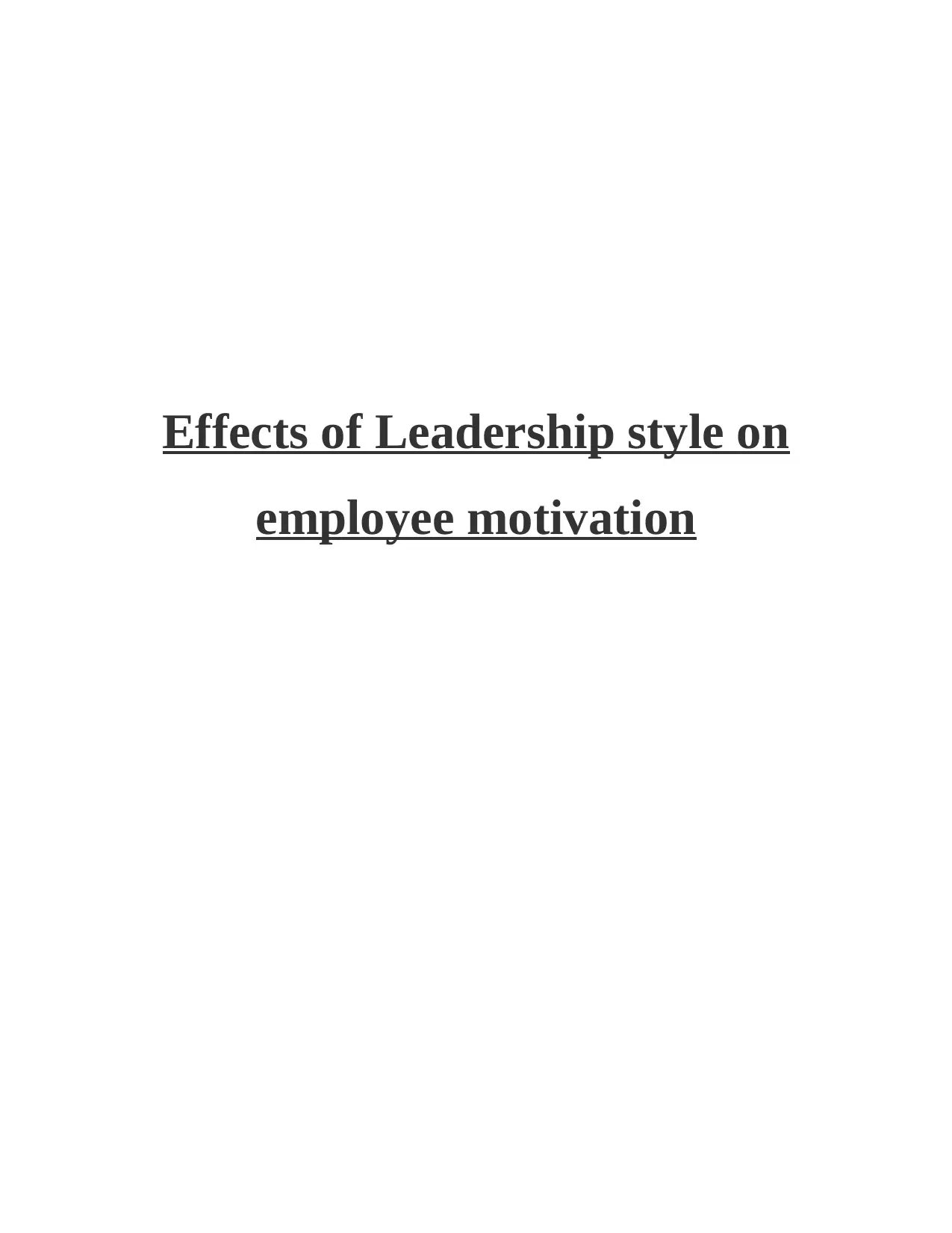
Effects of Leadership style on
employee motivation
employee motivation
Paraphrase This Document
Need a fresh take? Get an instant paraphrase of this document with our AI Paraphraser
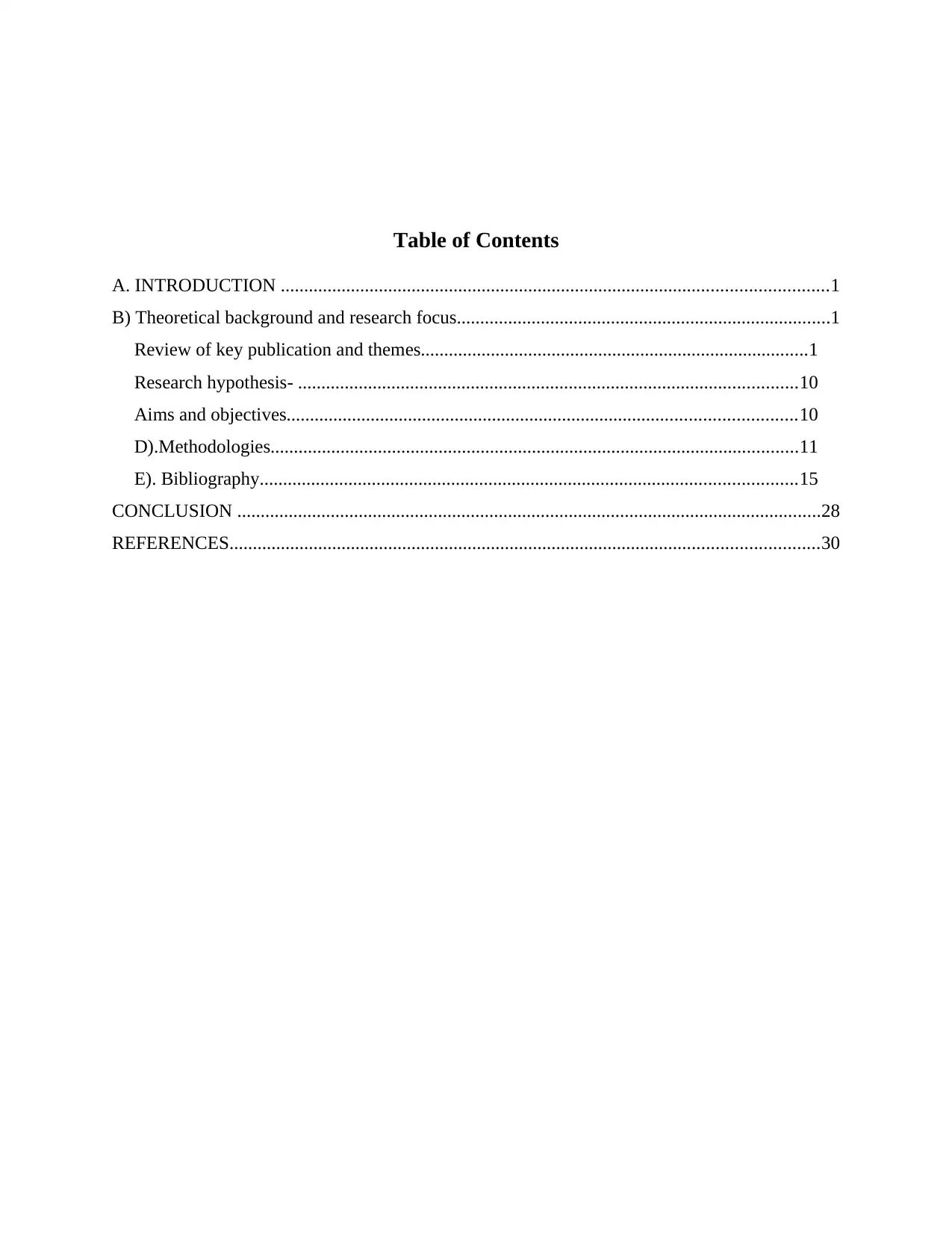
Table of Contents
A. INTRODUCTION .....................................................................................................................1
B) Theoretical background and research focus................................................................................1
Review of key publication and themes...................................................................................1
Research hypothesis- ...........................................................................................................10
Aims and objectives.............................................................................................................10
D).Methodologies.................................................................................................................11
E). Bibliography...................................................................................................................15
CONCLUSION .............................................................................................................................28
REFERENCES..............................................................................................................................30
A. INTRODUCTION .....................................................................................................................1
B) Theoretical background and research focus................................................................................1
Review of key publication and themes...................................................................................1
Research hypothesis- ...........................................................................................................10
Aims and objectives.............................................................................................................10
D).Methodologies.................................................................................................................11
E). Bibliography...................................................................................................................15
CONCLUSION .............................................................................................................................28
REFERENCES..............................................................................................................................30

⊘ This is a preview!⊘
Do you want full access?
Subscribe today to unlock all pages.

Trusted by 1+ million students worldwide
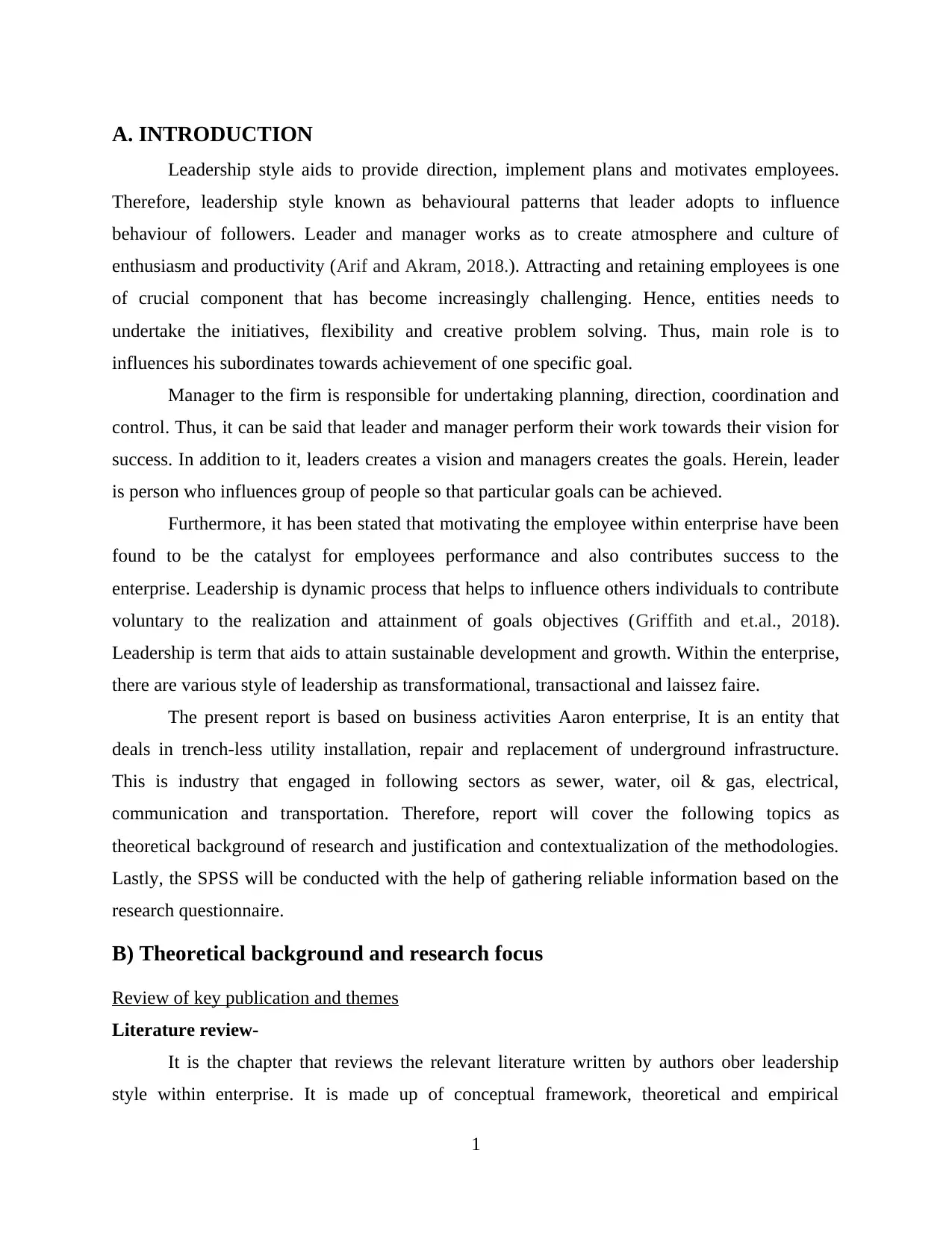
A. INTRODUCTION
Leadership style aids to provide direction, implement plans and motivates employees.
Therefore, leadership style known as behavioural patterns that leader adopts to influence
behaviour of followers. Leader and manager works as to create atmosphere and culture of
enthusiasm and productivity (Arif and Akram, 2018.). Attracting and retaining employees is one
of crucial component that has become increasingly challenging. Hence, entities needs to
undertake the initiatives, flexibility and creative problem solving. Thus, main role is to
influences his subordinates towards achievement of one specific goal.
Manager to the firm is responsible for undertaking planning, direction, coordination and
control. Thus, it can be said that leader and manager perform their work towards their vision for
success. In addition to it, leaders creates a vision and managers creates the goals. Herein, leader
is person who influences group of people so that particular goals can be achieved.
Furthermore, it has been stated that motivating the employee within enterprise have been
found to be the catalyst for employees performance and also contributes success to the
enterprise. Leadership is dynamic process that helps to influence others individuals to contribute
voluntary to the realization and attainment of goals objectives (Griffith and et.al., 2018).
Leadership is term that aids to attain sustainable development and growth. Within the enterprise,
there are various style of leadership as transformational, transactional and laissez faire.
The present report is based on business activities Aaron enterprise, It is an entity that
deals in trench-less utility installation, repair and replacement of underground infrastructure.
This is industry that engaged in following sectors as sewer, water, oil & gas, electrical,
communication and transportation. Therefore, report will cover the following topics as
theoretical background of research and justification and contextualization of the methodologies.
Lastly, the SPSS will be conducted with the help of gathering reliable information based on the
research questionnaire.
B) Theoretical background and research focus
Review of key publication and themes
Literature review-
It is the chapter that reviews the relevant literature written by authors ober leadership
style within enterprise. It is made up of conceptual framework, theoretical and empirical
1
Leadership style aids to provide direction, implement plans and motivates employees.
Therefore, leadership style known as behavioural patterns that leader adopts to influence
behaviour of followers. Leader and manager works as to create atmosphere and culture of
enthusiasm and productivity (Arif and Akram, 2018.). Attracting and retaining employees is one
of crucial component that has become increasingly challenging. Hence, entities needs to
undertake the initiatives, flexibility and creative problem solving. Thus, main role is to
influences his subordinates towards achievement of one specific goal.
Manager to the firm is responsible for undertaking planning, direction, coordination and
control. Thus, it can be said that leader and manager perform their work towards their vision for
success. In addition to it, leaders creates a vision and managers creates the goals. Herein, leader
is person who influences group of people so that particular goals can be achieved.
Furthermore, it has been stated that motivating the employee within enterprise have been
found to be the catalyst for employees performance and also contributes success to the
enterprise. Leadership is dynamic process that helps to influence others individuals to contribute
voluntary to the realization and attainment of goals objectives (Griffith and et.al., 2018).
Leadership is term that aids to attain sustainable development and growth. Within the enterprise,
there are various style of leadership as transformational, transactional and laissez faire.
The present report is based on business activities Aaron enterprise, It is an entity that
deals in trench-less utility installation, repair and replacement of underground infrastructure.
This is industry that engaged in following sectors as sewer, water, oil & gas, electrical,
communication and transportation. Therefore, report will cover the following topics as
theoretical background of research and justification and contextualization of the methodologies.
Lastly, the SPSS will be conducted with the help of gathering reliable information based on the
research questionnaire.
B) Theoretical background and research focus
Review of key publication and themes
Literature review-
It is the chapter that reviews the relevant literature written by authors ober leadership
style within enterprise. It is made up of conceptual framework, theoretical and empirical
1
Paraphrase This Document
Need a fresh take? Get an instant paraphrase of this document with our AI Paraphraser
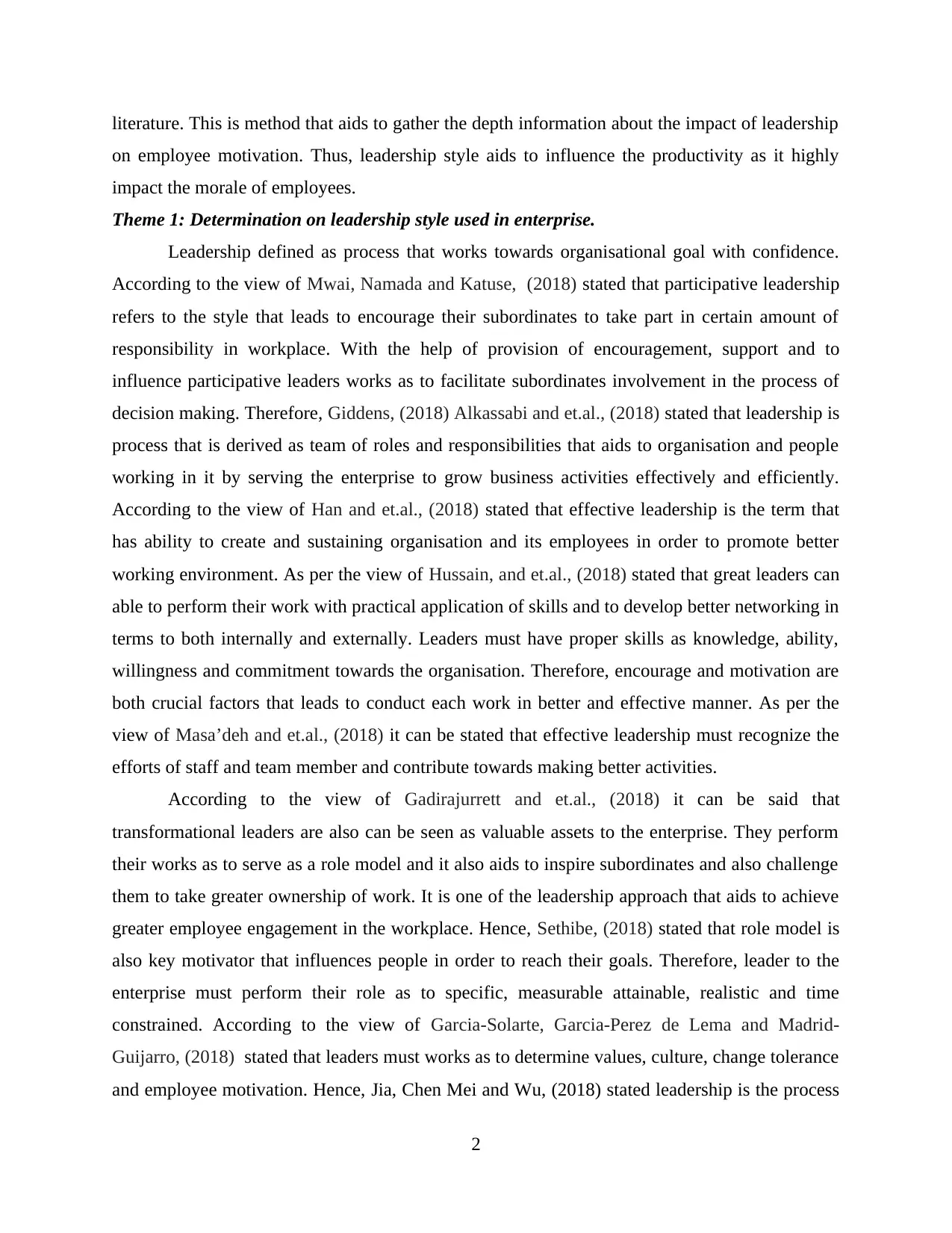
literature. This is method that aids to gather the depth information about the impact of leadership
on employee motivation. Thus, leadership style aids to influence the productivity as it highly
impact the morale of employees.
Theme 1: Determination on leadership style used in enterprise.
Leadership defined as process that works towards organisational goal with confidence.
According to the view of Mwai, Namada and Katuse, (2018) stated that participative leadership
refers to the style that leads to encourage their subordinates to take part in certain amount of
responsibility in workplace. With the help of provision of encouragement, support and to
influence participative leaders works as to facilitate subordinates involvement in the process of
decision making. Therefore, Giddens, (2018) Alkassabi and et.al., (2018) stated that leadership is
process that is derived as team of roles and responsibilities that aids to organisation and people
working in it by serving the enterprise to grow business activities effectively and efficiently.
According to the view of Han and et.al., (2018) stated that effective leadership is the term that
has ability to create and sustaining organisation and its employees in order to promote better
working environment. As per the view of Hussain, and et.al., (2018) stated that great leaders can
able to perform their work with practical application of skills and to develop better networking in
terms to both internally and externally. Leaders must have proper skills as knowledge, ability,
willingness and commitment towards the organisation. Therefore, encourage and motivation are
both crucial factors that leads to conduct each work in better and effective manner. As per the
view of Masa’deh and et.al., (2018) it can be stated that effective leadership must recognize the
efforts of staff and team member and contribute towards making better activities.
According to the view of Gadirajurrett and et.al., (2018) it can be said that
transformational leaders are also can be seen as valuable assets to the enterprise. They perform
their works as to serve as a role model and it also aids to inspire subordinates and also challenge
them to take greater ownership of work. It is one of the leadership approach that aids to achieve
greater employee engagement in the workplace. Hence, Sethibe, (2018) stated that role model is
also key motivator that influences people in order to reach their goals. Therefore, leader to the
enterprise must perform their role as to specific, measurable attainable, realistic and time
constrained. According to the view of Garcia-Solarte, Garcia-Perez de Lema and Madrid-
Guijarro, (2018) stated that leaders must works as to determine values, culture, change tolerance
and employee motivation. Hence, Jia, Chen Mei and Wu, (2018) stated leadership is the process
2
on employee motivation. Thus, leadership style aids to influence the productivity as it highly
impact the morale of employees.
Theme 1: Determination on leadership style used in enterprise.
Leadership defined as process that works towards organisational goal with confidence.
According to the view of Mwai, Namada and Katuse, (2018) stated that participative leadership
refers to the style that leads to encourage their subordinates to take part in certain amount of
responsibility in workplace. With the help of provision of encouragement, support and to
influence participative leaders works as to facilitate subordinates involvement in the process of
decision making. Therefore, Giddens, (2018) Alkassabi and et.al., (2018) stated that leadership is
process that is derived as team of roles and responsibilities that aids to organisation and people
working in it by serving the enterprise to grow business activities effectively and efficiently.
According to the view of Han and et.al., (2018) stated that effective leadership is the term that
has ability to create and sustaining organisation and its employees in order to promote better
working environment. As per the view of Hussain, and et.al., (2018) stated that great leaders can
able to perform their work with practical application of skills and to develop better networking in
terms to both internally and externally. Leaders must have proper skills as knowledge, ability,
willingness and commitment towards the organisation. Therefore, encourage and motivation are
both crucial factors that leads to conduct each work in better and effective manner. As per the
view of Masa’deh and et.al., (2018) it can be stated that effective leadership must recognize the
efforts of staff and team member and contribute towards making better activities.
According to the view of Gadirajurrett and et.al., (2018) it can be said that
transformational leaders are also can be seen as valuable assets to the enterprise. They perform
their works as to serve as a role model and it also aids to inspire subordinates and also challenge
them to take greater ownership of work. It is one of the leadership approach that aids to achieve
greater employee engagement in the workplace. Hence, Sethibe, (2018) stated that role model is
also key motivator that influences people in order to reach their goals. Therefore, leader to the
enterprise must perform their role as to specific, measurable attainable, realistic and time
constrained. According to the view of Garcia-Solarte, Garcia-Perez de Lema and Madrid-
Guijarro, (2018) stated that leaders must works as to determine values, culture, change tolerance
and employee motivation. Hence, Jia, Chen Mei and Wu, (2018) stated leadership is the process
2
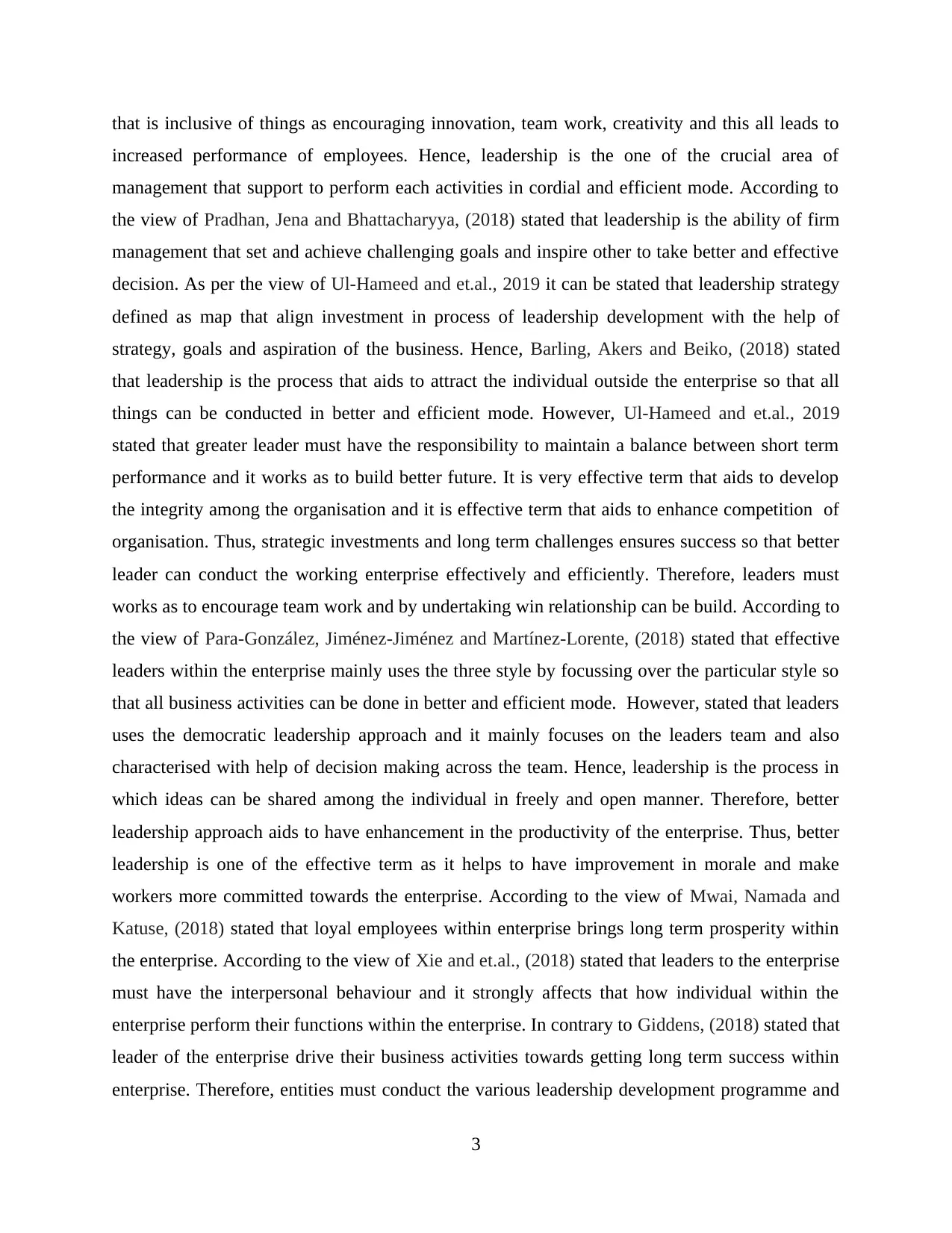
that is inclusive of things as encouraging innovation, team work, creativity and this all leads to
increased performance of employees. Hence, leadership is the one of the crucial area of
management that support to perform each activities in cordial and efficient mode. According to
the view of Pradhan, Jena and Bhattacharyya, (2018) stated that leadership is the ability of firm
management that set and achieve challenging goals and inspire other to take better and effective
decision. As per the view of Ul-Hameed and et.al., 2019 it can be stated that leadership strategy
defined as map that align investment in process of leadership development with the help of
strategy, goals and aspiration of the business. Hence, Barling, Akers and Beiko, (2018) stated
that leadership is the process that aids to attract the individual outside the enterprise so that all
things can be conducted in better and efficient mode. However, Ul-Hameed and et.al., 2019
stated that greater leader must have the responsibility to maintain a balance between short term
performance and it works as to build better future. It is very effective term that aids to develop
the integrity among the organisation and it is effective term that aids to enhance competition of
organisation. Thus, strategic investments and long term challenges ensures success so that better
leader can conduct the working enterprise effectively and efficiently. Therefore, leaders must
works as to encourage team work and by undertaking win relationship can be build. According to
the view of Para-González, Jiménez-Jiménez and Martínez-Lorente, (2018) stated that effective
leaders within the enterprise mainly uses the three style by focussing over the particular style so
that all business activities can be done in better and efficient mode. However, stated that leaders
uses the democratic leadership approach and it mainly focuses on the leaders team and also
characterised with help of decision making across the team. Hence, leadership is the process in
which ideas can be shared among the individual in freely and open manner. Therefore, better
leadership approach aids to have enhancement in the productivity of the enterprise. Thus, better
leadership is one of the effective term as it helps to have improvement in morale and make
workers more committed towards the enterprise. According to the view of Mwai, Namada and
Katuse, (2018) stated that loyal employees within enterprise brings long term prosperity within
the enterprise. According to the view of Xie and et.al., (2018) stated that leaders to the enterprise
must have the interpersonal behaviour and it strongly affects that how individual within the
enterprise perform their functions within the enterprise. In contrary to Giddens, (2018) stated that
leader of the enterprise drive their business activities towards getting long term success within
enterprise. Therefore, entities must conduct the various leadership development programme and
3
increased performance of employees. Hence, leadership is the one of the crucial area of
management that support to perform each activities in cordial and efficient mode. According to
the view of Pradhan, Jena and Bhattacharyya, (2018) stated that leadership is the ability of firm
management that set and achieve challenging goals and inspire other to take better and effective
decision. As per the view of Ul-Hameed and et.al., 2019 it can be stated that leadership strategy
defined as map that align investment in process of leadership development with the help of
strategy, goals and aspiration of the business. Hence, Barling, Akers and Beiko, (2018) stated
that leadership is the process that aids to attract the individual outside the enterprise so that all
things can be conducted in better and efficient mode. However, Ul-Hameed and et.al., 2019
stated that greater leader must have the responsibility to maintain a balance between short term
performance and it works as to build better future. It is very effective term that aids to develop
the integrity among the organisation and it is effective term that aids to enhance competition of
organisation. Thus, strategic investments and long term challenges ensures success so that better
leader can conduct the working enterprise effectively and efficiently. Therefore, leaders must
works as to encourage team work and by undertaking win relationship can be build. According to
the view of Para-González, Jiménez-Jiménez and Martínez-Lorente, (2018) stated that effective
leaders within the enterprise mainly uses the three style by focussing over the particular style so
that all business activities can be done in better and efficient mode. However, stated that leaders
uses the democratic leadership approach and it mainly focuses on the leaders team and also
characterised with help of decision making across the team. Hence, leadership is the process in
which ideas can be shared among the individual in freely and open manner. Therefore, better
leadership approach aids to have enhancement in the productivity of the enterprise. Thus, better
leadership is one of the effective term as it helps to have improvement in morale and make
workers more committed towards the enterprise. According to the view of Mwai, Namada and
Katuse, (2018) stated that loyal employees within enterprise brings long term prosperity within
the enterprise. According to the view of Xie and et.al., (2018) stated that leaders to the enterprise
must have the interpersonal behaviour and it strongly affects that how individual within the
enterprise perform their functions within the enterprise. In contrary to Giddens, (2018) stated that
leader of the enterprise drive their business activities towards getting long term success within
enterprise. Therefore, entities must conduct the various leadership development programme and
3
⊘ This is a preview!⊘
Do you want full access?
Subscribe today to unlock all pages.

Trusted by 1+ million students worldwide
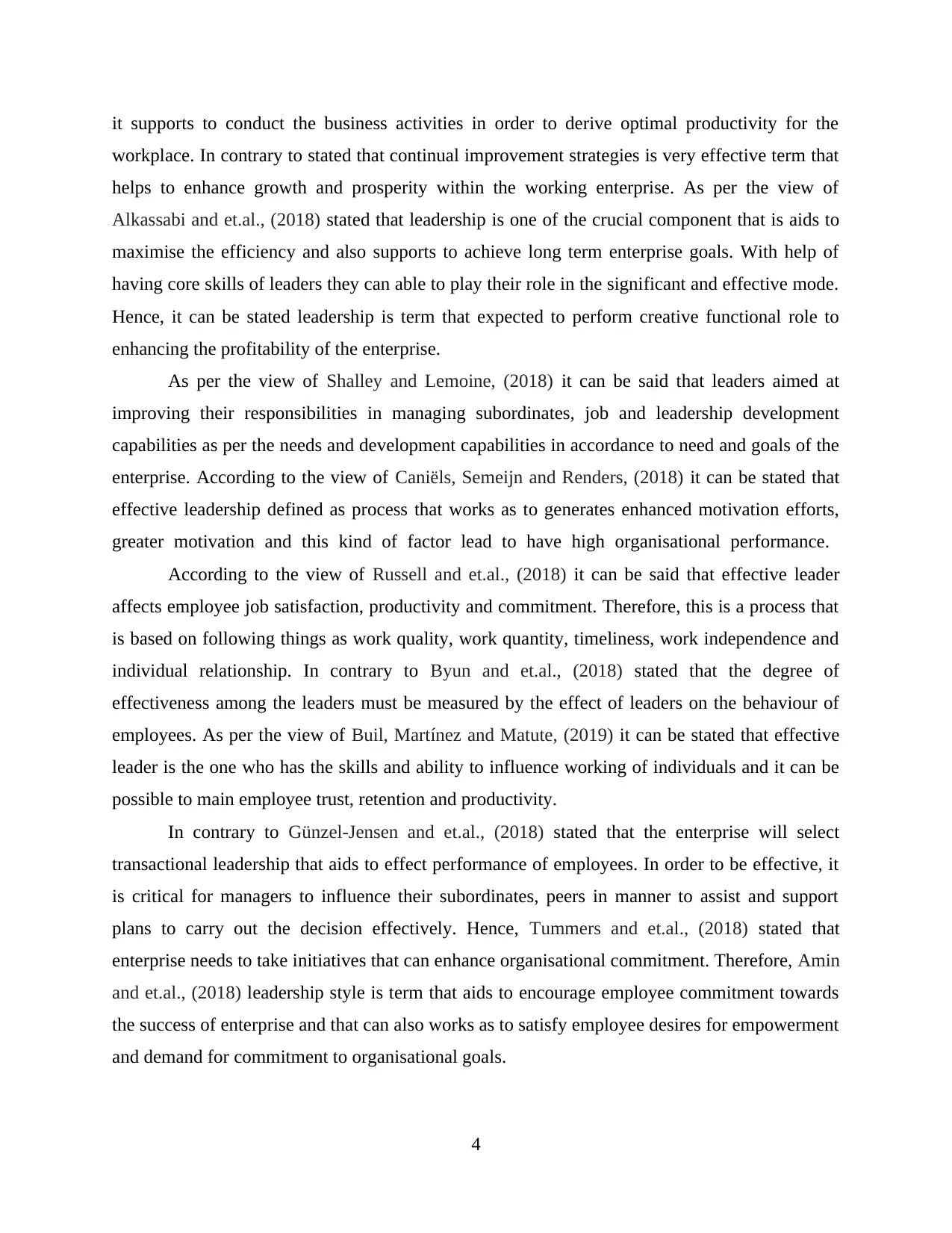
it supports to conduct the business activities in order to derive optimal productivity for the
workplace. In contrary to stated that continual improvement strategies is very effective term that
helps to enhance growth and prosperity within the working enterprise. As per the view of
Alkassabi and et.al., (2018) stated that leadership is one of the crucial component that is aids to
maximise the efficiency and also supports to achieve long term enterprise goals. With help of
having core skills of leaders they can able to play their role in the significant and effective mode.
Hence, it can be stated leadership is term that expected to perform creative functional role to
enhancing the profitability of the enterprise.
As per the view of Shalley and Lemoine, (2018) it can be said that leaders aimed at
improving their responsibilities in managing subordinates, job and leadership development
capabilities as per the needs and development capabilities in accordance to need and goals of the
enterprise. According to the view of Caniëls, Semeijn and Renders, (2018) it can be stated that
effective leadership defined as process that works as to generates enhanced motivation efforts,
greater motivation and this kind of factor lead to have high organisational performance.
According to the view of Russell and et.al., (2018) it can be said that effective leader
affects employee job satisfaction, productivity and commitment. Therefore, this is a process that
is based on following things as work quality, work quantity, timeliness, work independence and
individual relationship. In contrary to Byun and et.al., (2018) stated that the degree of
effectiveness among the leaders must be measured by the effect of leaders on the behaviour of
employees. As per the view of Buil, Martínez and Matute, (2019) it can be stated that effective
leader is the one who has the skills and ability to influence working of individuals and it can be
possible to main employee trust, retention and productivity.
In contrary to Günzel-Jensen and et.al., (2018) stated that the enterprise will select
transactional leadership that aids to effect performance of employees. In order to be effective, it
is critical for managers to influence their subordinates, peers in manner to assist and support
plans to carry out the decision effectively. Hence, Tummers and et.al., (2018) stated that
enterprise needs to take initiatives that can enhance organisational commitment. Therefore, Amin
and et.al., (2018) leadership style is term that aids to encourage employee commitment towards
the success of enterprise and that can also works as to satisfy employee desires for empowerment
and demand for commitment to organisational goals.
4
workplace. In contrary to stated that continual improvement strategies is very effective term that
helps to enhance growth and prosperity within the working enterprise. As per the view of
Alkassabi and et.al., (2018) stated that leadership is one of the crucial component that is aids to
maximise the efficiency and also supports to achieve long term enterprise goals. With help of
having core skills of leaders they can able to play their role in the significant and effective mode.
Hence, it can be stated leadership is term that expected to perform creative functional role to
enhancing the profitability of the enterprise.
As per the view of Shalley and Lemoine, (2018) it can be said that leaders aimed at
improving their responsibilities in managing subordinates, job and leadership development
capabilities as per the needs and development capabilities in accordance to need and goals of the
enterprise. According to the view of Caniëls, Semeijn and Renders, (2018) it can be stated that
effective leadership defined as process that works as to generates enhanced motivation efforts,
greater motivation and this kind of factor lead to have high organisational performance.
According to the view of Russell and et.al., (2018) it can be said that effective leader
affects employee job satisfaction, productivity and commitment. Therefore, this is a process that
is based on following things as work quality, work quantity, timeliness, work independence and
individual relationship. In contrary to Byun and et.al., (2018) stated that the degree of
effectiveness among the leaders must be measured by the effect of leaders on the behaviour of
employees. As per the view of Buil, Martínez and Matute, (2019) it can be stated that effective
leader is the one who has the skills and ability to influence working of individuals and it can be
possible to main employee trust, retention and productivity.
In contrary to Günzel-Jensen and et.al., (2018) stated that the enterprise will select
transactional leadership that aids to effect performance of employees. In order to be effective, it
is critical for managers to influence their subordinates, peers in manner to assist and support
plans to carry out the decision effectively. Hence, Tummers and et.al., (2018) stated that
enterprise needs to take initiatives that can enhance organisational commitment. Therefore, Amin
and et.al., (2018) leadership style is term that aids to encourage employee commitment towards
the success of enterprise and that can also works as to satisfy employee desires for empowerment
and demand for commitment to organisational goals.
4
Paraphrase This Document
Need a fresh take? Get an instant paraphrase of this document with our AI Paraphraser
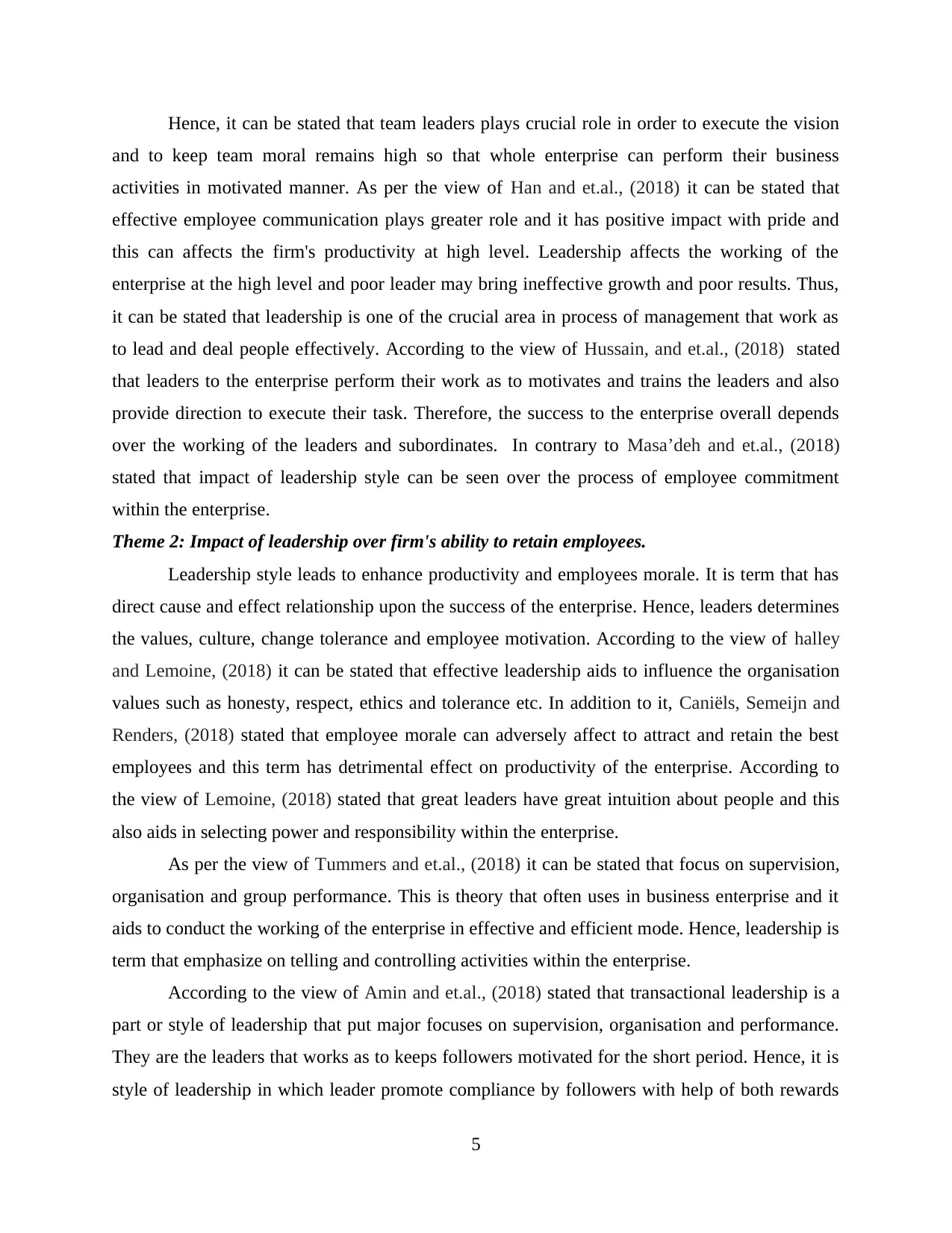
Hence, it can be stated that team leaders plays crucial role in order to execute the vision
and to keep team moral remains high so that whole enterprise can perform their business
activities in motivated manner. As per the view of Han and et.al., (2018) it can be stated that
effective employee communication plays greater role and it has positive impact with pride and
this can affects the firm's productivity at high level. Leadership affects the working of the
enterprise at the high level and poor leader may bring ineffective growth and poor results. Thus,
it can be stated that leadership is one of the crucial area in process of management that work as
to lead and deal people effectively. According to the view of Hussain, and et.al., (2018) stated
that leaders to the enterprise perform their work as to motivates and trains the leaders and also
provide direction to execute their task. Therefore, the success to the enterprise overall depends
over the working of the leaders and subordinates. In contrary to Masa’deh and et.al., (2018)
stated that impact of leadership style can be seen over the process of employee commitment
within the enterprise.
Theme 2: Impact of leadership over firm's ability to retain employees.
Leadership style leads to enhance productivity and employees morale. It is term that has
direct cause and effect relationship upon the success of the enterprise. Hence, leaders determines
the values, culture, change tolerance and employee motivation. According to the view of halley
and Lemoine, (2018) it can be stated that effective leadership aids to influence the organisation
values such as honesty, respect, ethics and tolerance etc. In addition to it, Caniëls, Semeijn and
Renders, (2018) stated that employee morale can adversely affect to attract and retain the best
employees and this term has detrimental effect on productivity of the enterprise. According to
the view of Lemoine, (2018) stated that great leaders have great intuition about people and this
also aids in selecting power and responsibility within the enterprise.
As per the view of Tummers and et.al., (2018) it can be stated that focus on supervision,
organisation and group performance. This is theory that often uses in business enterprise and it
aids to conduct the working of the enterprise in effective and efficient mode. Hence, leadership is
term that emphasize on telling and controlling activities within the enterprise.
According to the view of Amin and et.al., (2018) stated that transactional leadership is a
part or style of leadership that put major focuses on supervision, organisation and performance.
They are the leaders that works as to keeps followers motivated for the short period. Hence, it is
style of leadership in which leader promote compliance by followers with help of both rewards
5
and to keep team moral remains high so that whole enterprise can perform their business
activities in motivated manner. As per the view of Han and et.al., (2018) it can be stated that
effective employee communication plays greater role and it has positive impact with pride and
this can affects the firm's productivity at high level. Leadership affects the working of the
enterprise at the high level and poor leader may bring ineffective growth and poor results. Thus,
it can be stated that leadership is one of the crucial area in process of management that work as
to lead and deal people effectively. According to the view of Hussain, and et.al., (2018) stated
that leaders to the enterprise perform their work as to motivates and trains the leaders and also
provide direction to execute their task. Therefore, the success to the enterprise overall depends
over the working of the leaders and subordinates. In contrary to Masa’deh and et.al., (2018)
stated that impact of leadership style can be seen over the process of employee commitment
within the enterprise.
Theme 2: Impact of leadership over firm's ability to retain employees.
Leadership style leads to enhance productivity and employees morale. It is term that has
direct cause and effect relationship upon the success of the enterprise. Hence, leaders determines
the values, culture, change tolerance and employee motivation. According to the view of halley
and Lemoine, (2018) it can be stated that effective leadership aids to influence the organisation
values such as honesty, respect, ethics and tolerance etc. In addition to it, Caniëls, Semeijn and
Renders, (2018) stated that employee morale can adversely affect to attract and retain the best
employees and this term has detrimental effect on productivity of the enterprise. According to
the view of Lemoine, (2018) stated that great leaders have great intuition about people and this
also aids in selecting power and responsibility within the enterprise.
As per the view of Tummers and et.al., (2018) it can be stated that focus on supervision,
organisation and group performance. This is theory that often uses in business enterprise and it
aids to conduct the working of the enterprise in effective and efficient mode. Hence, leadership is
term that emphasize on telling and controlling activities within the enterprise.
According to the view of Amin and et.al., (2018) stated that transactional leadership is a
part or style of leadership that put major focuses on supervision, organisation and performance.
They are the leaders that works as to keeps followers motivated for the short period. Hence, it is
style of leadership in which leader promote compliance by followers with help of both rewards
5
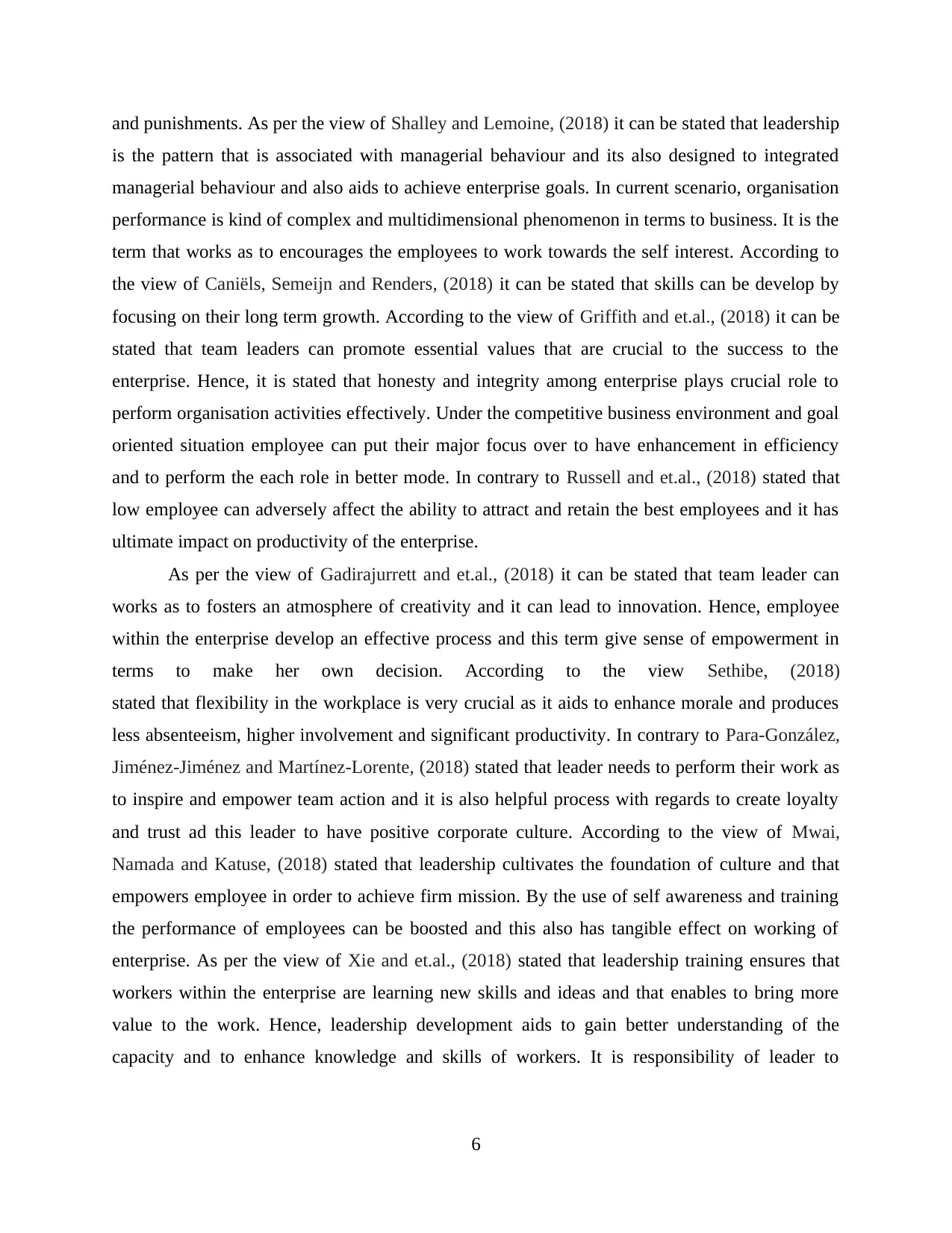
and punishments. As per the view of Shalley and Lemoine, (2018) it can be stated that leadership
is the pattern that is associated with managerial behaviour and its also designed to integrated
managerial behaviour and also aids to achieve enterprise goals. In current scenario, organisation
performance is kind of complex and multidimensional phenomenon in terms to business. It is the
term that works as to encourages the employees to work towards the self interest. According to
the view of Caniëls, Semeijn and Renders, (2018) it can be stated that skills can be develop by
focusing on their long term growth. According to the view of Griffith and et.al., (2018) it can be
stated that team leaders can promote essential values that are crucial to the success to the
enterprise. Hence, it is stated that honesty and integrity among enterprise plays crucial role to
perform organisation activities effectively. Under the competitive business environment and goal
oriented situation employee can put their major focus over to have enhancement in efficiency
and to perform the each role in better mode. In contrary to Russell and et.al., (2018) stated that
low employee can adversely affect the ability to attract and retain the best employees and it has
ultimate impact on productivity of the enterprise.
As per the view of Gadirajurrett and et.al., (2018) it can be stated that team leader can
works as to fosters an atmosphere of creativity and it can lead to innovation. Hence, employee
within the enterprise develop an effective process and this term give sense of empowerment in
terms to make her own decision. According to the view Sethibe, (2018)
stated that flexibility in the workplace is very crucial as it aids to enhance morale and produces
less absenteeism, higher involvement and significant productivity. In contrary to Para-González,
Jiménez-Jiménez and Martínez-Lorente, (2018) stated that leader needs to perform their work as
to inspire and empower team action and it is also helpful process with regards to create loyalty
and trust ad this leader to have positive corporate culture. According to the view of Mwai,
Namada and Katuse, (2018) stated that leadership cultivates the foundation of culture and that
empowers employee in order to achieve firm mission. By the use of self awareness and training
the performance of employees can be boosted and this also has tangible effect on working of
enterprise. As per the view of Xie and et.al., (2018) stated that leadership training ensures that
workers within the enterprise are learning new skills and ideas and that enables to bring more
value to the work. Hence, leadership development aids to gain better understanding of the
capacity and to enhance knowledge and skills of workers. It is responsibility of leader to
6
is the pattern that is associated with managerial behaviour and its also designed to integrated
managerial behaviour and also aids to achieve enterprise goals. In current scenario, organisation
performance is kind of complex and multidimensional phenomenon in terms to business. It is the
term that works as to encourages the employees to work towards the self interest. According to
the view of Caniëls, Semeijn and Renders, (2018) it can be stated that skills can be develop by
focusing on their long term growth. According to the view of Griffith and et.al., (2018) it can be
stated that team leaders can promote essential values that are crucial to the success to the
enterprise. Hence, it is stated that honesty and integrity among enterprise plays crucial role to
perform organisation activities effectively. Under the competitive business environment and goal
oriented situation employee can put their major focus over to have enhancement in efficiency
and to perform the each role in better mode. In contrary to Russell and et.al., (2018) stated that
low employee can adversely affect the ability to attract and retain the best employees and it has
ultimate impact on productivity of the enterprise.
As per the view of Gadirajurrett and et.al., (2018) it can be stated that team leader can
works as to fosters an atmosphere of creativity and it can lead to innovation. Hence, employee
within the enterprise develop an effective process and this term give sense of empowerment in
terms to make her own decision. According to the view Sethibe, (2018)
stated that flexibility in the workplace is very crucial as it aids to enhance morale and produces
less absenteeism, higher involvement and significant productivity. In contrary to Para-González,
Jiménez-Jiménez and Martínez-Lorente, (2018) stated that leader needs to perform their work as
to inspire and empower team action and it is also helpful process with regards to create loyalty
and trust ad this leader to have positive corporate culture. According to the view of Mwai,
Namada and Katuse, (2018) stated that leadership cultivates the foundation of culture and that
empowers employee in order to achieve firm mission. By the use of self awareness and training
the performance of employees can be boosted and this also has tangible effect on working of
enterprise. As per the view of Xie and et.al., (2018) stated that leadership training ensures that
workers within the enterprise are learning new skills and ideas and that enables to bring more
value to the work. Hence, leadership development aids to gain better understanding of the
capacity and to enhance knowledge and skills of workers. It is responsibility of leader to
6
⊘ This is a preview!⊘
Do you want full access?
Subscribe today to unlock all pages.

Trusted by 1+ million students worldwide
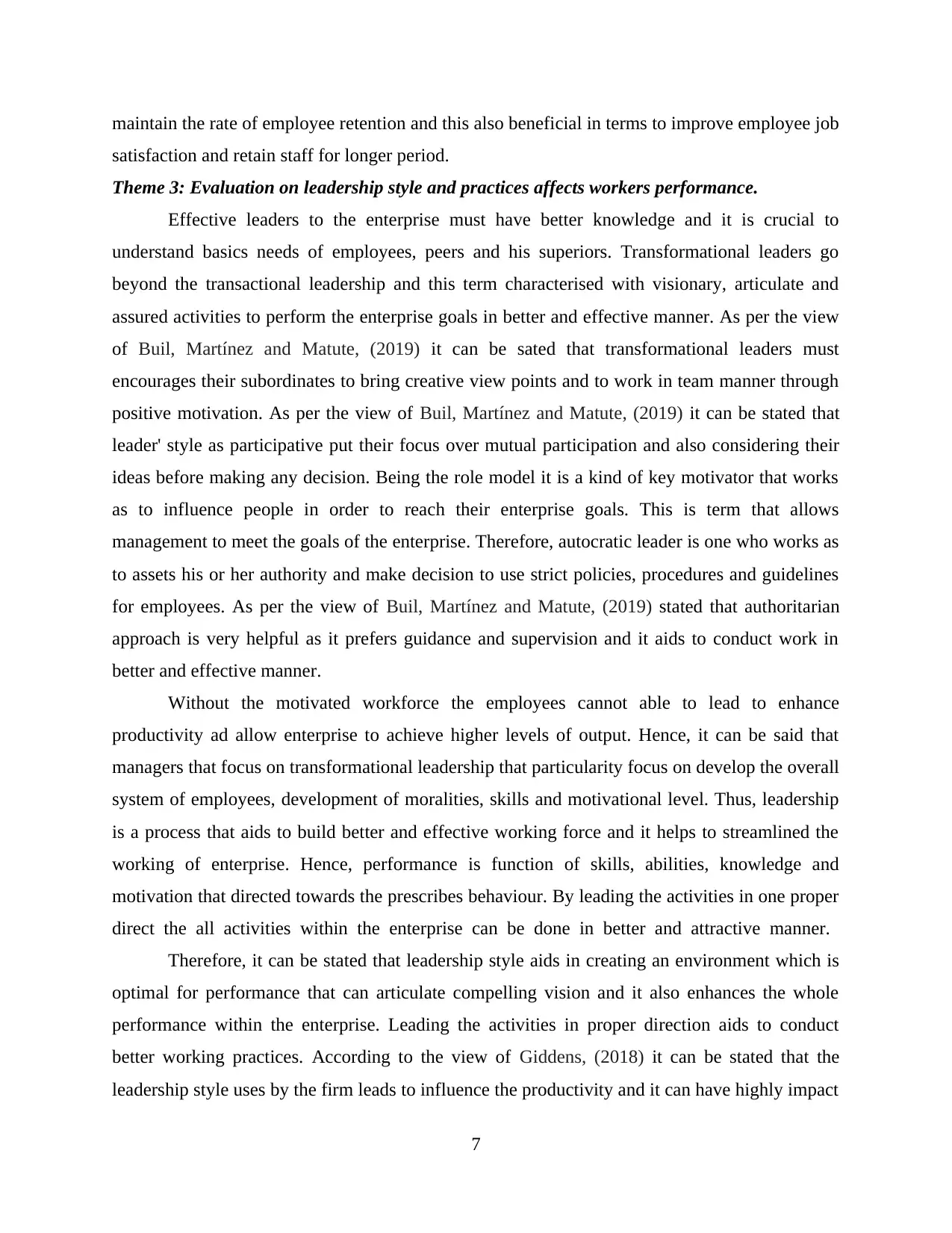
maintain the rate of employee retention and this also beneficial in terms to improve employee job
satisfaction and retain staff for longer period.
Theme 3: Evaluation on leadership style and practices affects workers performance.
Effective leaders to the enterprise must have better knowledge and it is crucial to
understand basics needs of employees, peers and his superiors. Transformational leaders go
beyond the transactional leadership and this term characterised with visionary, articulate and
assured activities to perform the enterprise goals in better and effective manner. As per the view
of Buil, Martínez and Matute, (2019) it can be sated that transformational leaders must
encourages their subordinates to bring creative view points and to work in team manner through
positive motivation. As per the view of Buil, Martínez and Matute, (2019) it can be stated that
leader' style as participative put their focus over mutual participation and also considering their
ideas before making any decision. Being the role model it is a kind of key motivator that works
as to influence people in order to reach their enterprise goals. This is term that allows
management to meet the goals of the enterprise. Therefore, autocratic leader is one who works as
to assets his or her authority and make decision to use strict policies, procedures and guidelines
for employees. As per the view of Buil, Martínez and Matute, (2019) stated that authoritarian
approach is very helpful as it prefers guidance and supervision and it aids to conduct work in
better and effective manner.
Without the motivated workforce the employees cannot able to lead to enhance
productivity ad allow enterprise to achieve higher levels of output. Hence, it can be said that
managers that focus on transformational leadership that particularity focus on develop the overall
system of employees, development of moralities, skills and motivational level. Thus, leadership
is a process that aids to build better and effective working force and it helps to streamlined the
working of enterprise. Hence, performance is function of skills, abilities, knowledge and
motivation that directed towards the prescribes behaviour. By leading the activities in one proper
direct the all activities within the enterprise can be done in better and attractive manner.
Therefore, it can be stated that leadership style aids in creating an environment which is
optimal for performance that can articulate compelling vision and it also enhances the whole
performance within the enterprise. Leading the activities in proper direction aids to conduct
better working practices. According to the view of Giddens, (2018) it can be stated that the
leadership style uses by the firm leads to influence the productivity and it can have highly impact
7
satisfaction and retain staff for longer period.
Theme 3: Evaluation on leadership style and practices affects workers performance.
Effective leaders to the enterprise must have better knowledge and it is crucial to
understand basics needs of employees, peers and his superiors. Transformational leaders go
beyond the transactional leadership and this term characterised with visionary, articulate and
assured activities to perform the enterprise goals in better and effective manner. As per the view
of Buil, Martínez and Matute, (2019) it can be sated that transformational leaders must
encourages their subordinates to bring creative view points and to work in team manner through
positive motivation. As per the view of Buil, Martínez and Matute, (2019) it can be stated that
leader' style as participative put their focus over mutual participation and also considering their
ideas before making any decision. Being the role model it is a kind of key motivator that works
as to influence people in order to reach their enterprise goals. This is term that allows
management to meet the goals of the enterprise. Therefore, autocratic leader is one who works as
to assets his or her authority and make decision to use strict policies, procedures and guidelines
for employees. As per the view of Buil, Martínez and Matute, (2019) stated that authoritarian
approach is very helpful as it prefers guidance and supervision and it aids to conduct work in
better and effective manner.
Without the motivated workforce the employees cannot able to lead to enhance
productivity ad allow enterprise to achieve higher levels of output. Hence, it can be said that
managers that focus on transformational leadership that particularity focus on develop the overall
system of employees, development of moralities, skills and motivational level. Thus, leadership
is a process that aids to build better and effective working force and it helps to streamlined the
working of enterprise. Hence, performance is function of skills, abilities, knowledge and
motivation that directed towards the prescribes behaviour. By leading the activities in one proper
direct the all activities within the enterprise can be done in better and attractive manner.
Therefore, it can be stated that leadership style aids in creating an environment which is
optimal for performance that can articulate compelling vision and it also enhances the whole
performance within the enterprise. Leading the activities in proper direction aids to conduct
better working practices. According to the view of Giddens, (2018) it can be stated that the
leadership style uses by the firm leads to influence the productivity and it can have highly impact
7
Paraphrase This Document
Need a fresh take? Get an instant paraphrase of this document with our AI Paraphraser
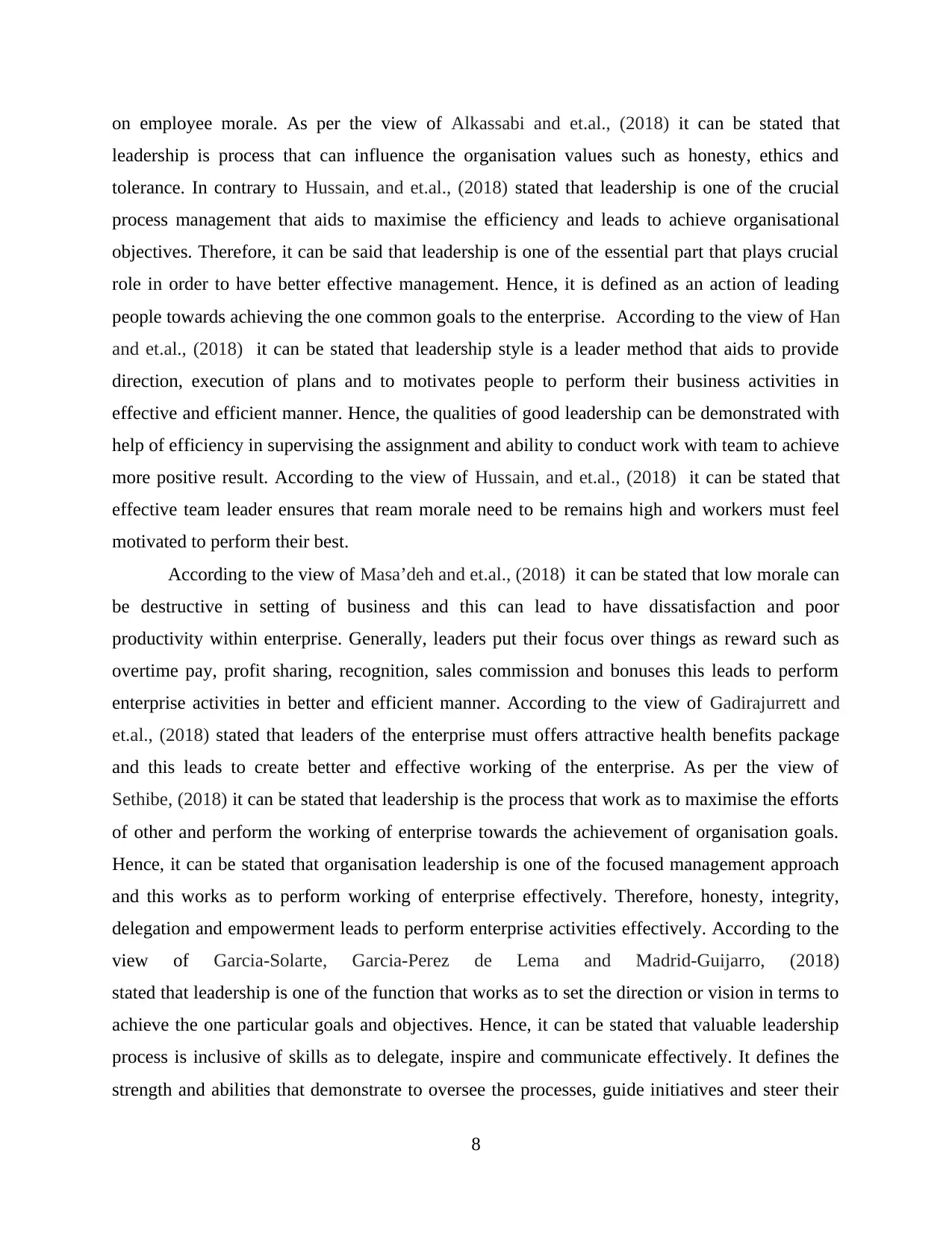
on employee morale. As per the view of Alkassabi and et.al., (2018) it can be stated that
leadership is process that can influence the organisation values such as honesty, ethics and
tolerance. In contrary to Hussain, and et.al., (2018) stated that leadership is one of the crucial
process management that aids to maximise the efficiency and leads to achieve organisational
objectives. Therefore, it can be said that leadership is one of the essential part that plays crucial
role in order to have better effective management. Hence, it is defined as an action of leading
people towards achieving the one common goals to the enterprise. According to the view of Han
and et.al., (2018) it can be stated that leadership style is a leader method that aids to provide
direction, execution of plans and to motivates people to perform their business activities in
effective and efficient manner. Hence, the qualities of good leadership can be demonstrated with
help of efficiency in supervising the assignment and ability to conduct work with team to achieve
more positive result. According to the view of Hussain, and et.al., (2018) it can be stated that
effective team leader ensures that ream morale need to be remains high and workers must feel
motivated to perform their best.
According to the view of Masa’deh and et.al., (2018) it can be stated that low morale can
be destructive in setting of business and this can lead to have dissatisfaction and poor
productivity within enterprise. Generally, leaders put their focus over things as reward such as
overtime pay, profit sharing, recognition, sales commission and bonuses this leads to perform
enterprise activities in better and efficient manner. According to the view of Gadirajurrett and
et.al., (2018) stated that leaders of the enterprise must offers attractive health benefits package
and this leads to create better and effective working of the enterprise. As per the view of
Sethibe, (2018) it can be stated that leadership is the process that work as to maximise the efforts
of other and perform the working of enterprise towards the achievement of organisation goals.
Hence, it can be stated that organisation leadership is one of the focused management approach
and this works as to perform working of enterprise effectively. Therefore, honesty, integrity,
delegation and empowerment leads to perform enterprise activities effectively. According to the
view of Garcia-Solarte, Garcia-Perez de Lema and Madrid-Guijarro, (2018)
stated that leadership is one of the function that works as to set the direction or vision in terms to
achieve the one particular goals and objectives. Hence, it can be stated that valuable leadership
process is inclusive of skills as to delegate, inspire and communicate effectively. It defines the
strength and abilities that demonstrate to oversee the processes, guide initiatives and steer their
8
leadership is process that can influence the organisation values such as honesty, ethics and
tolerance. In contrary to Hussain, and et.al., (2018) stated that leadership is one of the crucial
process management that aids to maximise the efficiency and leads to achieve organisational
objectives. Therefore, it can be said that leadership is one of the essential part that plays crucial
role in order to have better effective management. Hence, it is defined as an action of leading
people towards achieving the one common goals to the enterprise. According to the view of Han
and et.al., (2018) it can be stated that leadership style is a leader method that aids to provide
direction, execution of plans and to motivates people to perform their business activities in
effective and efficient manner. Hence, the qualities of good leadership can be demonstrated with
help of efficiency in supervising the assignment and ability to conduct work with team to achieve
more positive result. According to the view of Hussain, and et.al., (2018) it can be stated that
effective team leader ensures that ream morale need to be remains high and workers must feel
motivated to perform their best.
According to the view of Masa’deh and et.al., (2018) it can be stated that low morale can
be destructive in setting of business and this can lead to have dissatisfaction and poor
productivity within enterprise. Generally, leaders put their focus over things as reward such as
overtime pay, profit sharing, recognition, sales commission and bonuses this leads to perform
enterprise activities in better and efficient manner. According to the view of Gadirajurrett and
et.al., (2018) stated that leaders of the enterprise must offers attractive health benefits package
and this leads to create better and effective working of the enterprise. As per the view of
Sethibe, (2018) it can be stated that leadership is the process that work as to maximise the efforts
of other and perform the working of enterprise towards the achievement of organisation goals.
Hence, it can be stated that organisation leadership is one of the focused management approach
and this works as to perform working of enterprise effectively. Therefore, honesty, integrity,
delegation and empowerment leads to perform enterprise activities effectively. According to the
view of Garcia-Solarte, Garcia-Perez de Lema and Madrid-Guijarro, (2018)
stated that leadership is one of the function that works as to set the direction or vision in terms to
achieve the one particular goals and objectives. Hence, it can be stated that valuable leadership
process is inclusive of skills as to delegate, inspire and communicate effectively. It defines the
strength and abilities that demonstrate to oversee the processes, guide initiatives and steer their
8
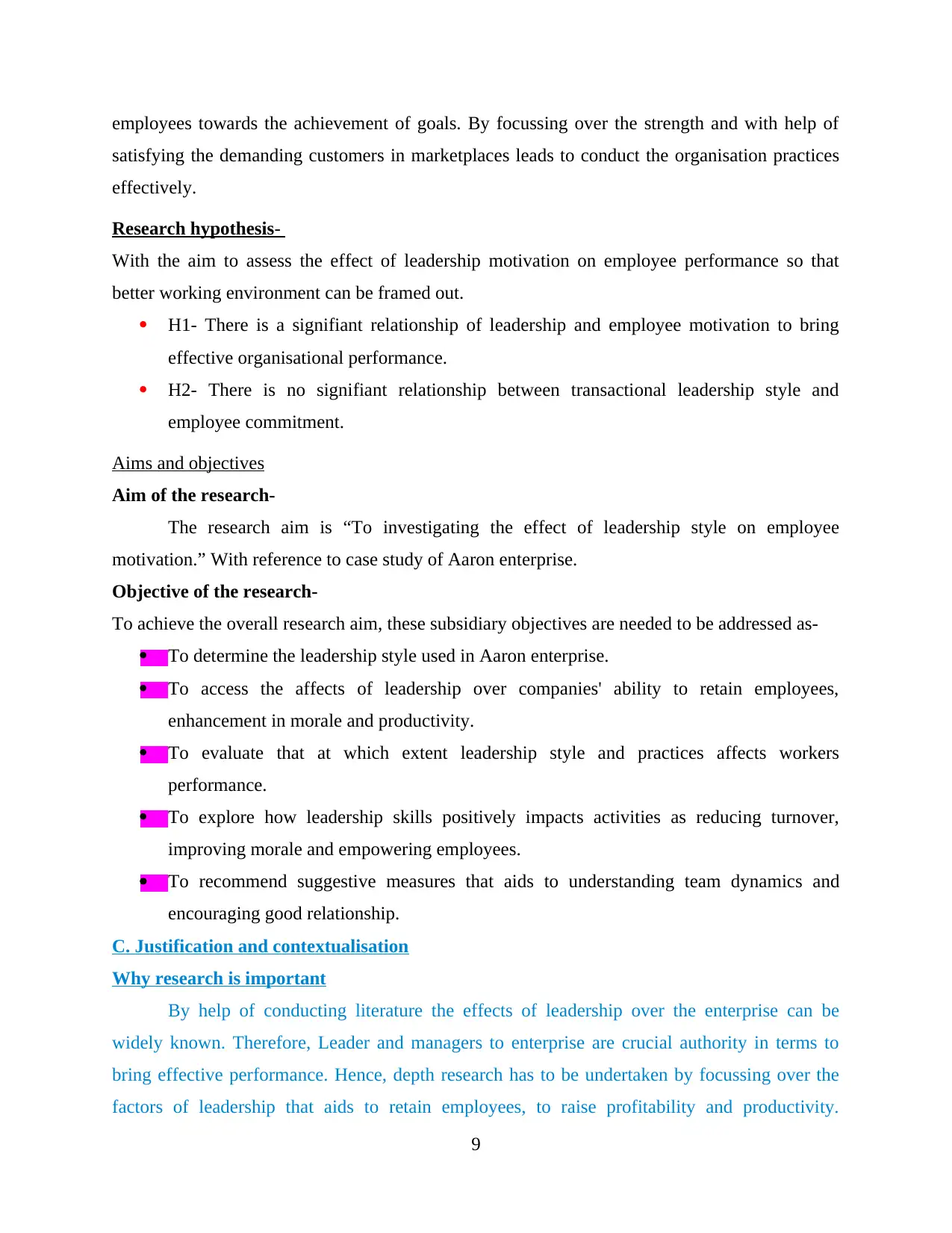
employees towards the achievement of goals. By focussing over the strength and with help of
satisfying the demanding customers in marketplaces leads to conduct the organisation practices
effectively.
Research hypothesis-
With the aim to assess the effect of leadership motivation on employee performance so that
better working environment can be framed out.
H1- There is a signifiant relationship of leadership and employee motivation to bring
effective organisational performance.
H2- There is no signifiant relationship between transactional leadership style and
employee commitment.
Aims and objectives
Aim of the research-
The research aim is “To investigating the effect of leadership style on employee
motivation.” With reference to case study of Aaron enterprise.
Objective of the research-
To achieve the overall research aim, these subsidiary objectives are needed to be addressed as-
To determine the leadership style used in Aaron enterprise.
To access the affects of leadership over companies' ability to retain employees,
enhancement in morale and productivity.
To evaluate that at which extent leadership style and practices affects workers
performance.
To explore how leadership skills positively impacts activities as reducing turnover,
improving morale and empowering employees.
To recommend suggestive measures that aids to understanding team dynamics and
encouraging good relationship.
C. Justification and contextualisation
Why research is important
By help of conducting literature the effects of leadership over the enterprise can be
widely known. Therefore, Leader and managers to enterprise are crucial authority in terms to
bring effective performance. Hence, depth research has to be undertaken by focussing over the
factors of leadership that aids to retain employees, to raise profitability and productivity.
9
satisfying the demanding customers in marketplaces leads to conduct the organisation practices
effectively.
Research hypothesis-
With the aim to assess the effect of leadership motivation on employee performance so that
better working environment can be framed out.
H1- There is a signifiant relationship of leadership and employee motivation to bring
effective organisational performance.
H2- There is no signifiant relationship between transactional leadership style and
employee commitment.
Aims and objectives
Aim of the research-
The research aim is “To investigating the effect of leadership style on employee
motivation.” With reference to case study of Aaron enterprise.
Objective of the research-
To achieve the overall research aim, these subsidiary objectives are needed to be addressed as-
To determine the leadership style used in Aaron enterprise.
To access the affects of leadership over companies' ability to retain employees,
enhancement in morale and productivity.
To evaluate that at which extent leadership style and practices affects workers
performance.
To explore how leadership skills positively impacts activities as reducing turnover,
improving morale and empowering employees.
To recommend suggestive measures that aids to understanding team dynamics and
encouraging good relationship.
C. Justification and contextualisation
Why research is important
By help of conducting literature the effects of leadership over the enterprise can be
widely known. Therefore, Leader and managers to enterprise are crucial authority in terms to
bring effective performance. Hence, depth research has to be undertaken by focussing over the
factors of leadership that aids to retain employees, to raise profitability and productivity.
9
⊘ This is a preview!⊘
Do you want full access?
Subscribe today to unlock all pages.

Trusted by 1+ million students worldwide
1 out of 37
Related Documents
Your All-in-One AI-Powered Toolkit for Academic Success.
+13062052269
info@desklib.com
Available 24*7 on WhatsApp / Email
![[object Object]](/_next/static/media/star-bottom.7253800d.svg)
Unlock your academic potential
Copyright © 2020–2026 A2Z Services. All Rights Reserved. Developed and managed by ZUCOL.



